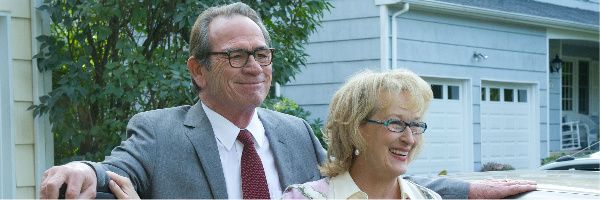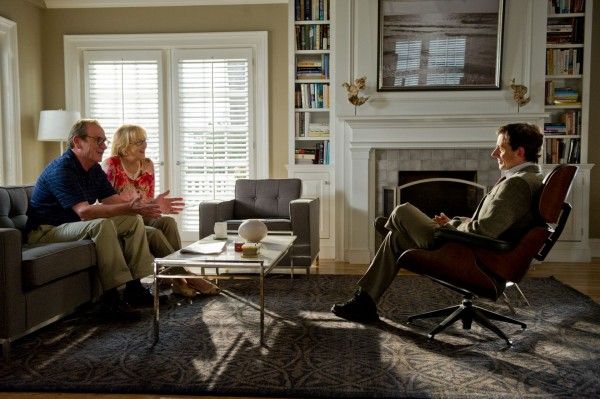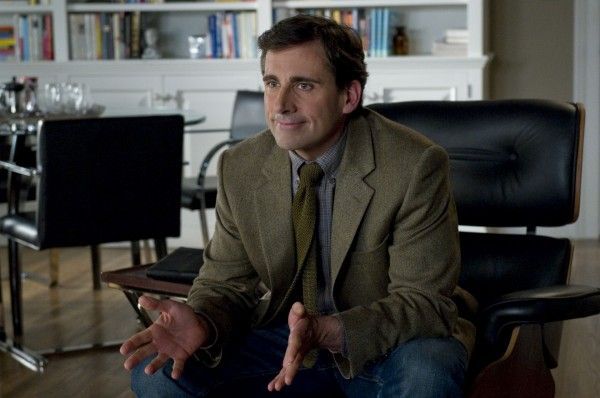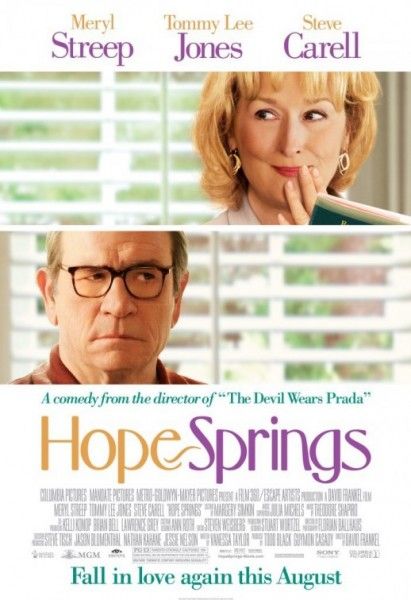Hope Springs is an actor's movie through-and-through. The film is about intimacy, and David Frankel's direction wisely lets the action unfold over a few locations, relies on close-ups when necessary, and then allows his talented lead cast carry the picture, particularly Tommy Lee Jones. Summer 2012 has shown us two Joneses. There's the I-Don't-Give-a-Shit-and-I-Don't-Want-to-Be-Here-Give-Me-My-Money Tommy Lee Jones of Men in Black 3. And then there's the I'm-Really-Good-if-I-Want-to-Be Tommy Lee Jones of Hope Springs. The strength of his performance, coupled with co-stars Meryl Streep and Steve Carell, almost makes Hope Springs a stage play except Frankel never makes it feel stage-y. The director also provides the film's only major obstacle when he tries to force emotions on a scene where Jones, Streep, and Carell are more than capable of delivering the humor, warmth, and drama of this surprisingly enjoyable film.
Sex has vanished from Kay (Streep) and Arnold's (Jones) marriage. Their relationship bears a closer resemblance to roommates than a married couple since they don't even sleep in the same room anymore (not because they dislike each other, but because Arnold says he has sleep apnea). Kay desperately wants to put the spark back in their relationship, but Arnold seems disinterested. She manages to drag him to an intensive week-long session with marriage counselor Dr. Feld (Carell) in an attempt to re-energize their relationship by reigniting their sex drives. From there, we see how the couple's attempts at physical intimacy force them to confront their emotional barriers.
The movie has a simple premise at its core and it goes a long way: it's funny and heartwarming to watch two sexually repressed people learn how to be sexual again. Hope Springs easily could have been painfully uncomfortable for the audience, but Streep and especially Jones make the comedy work because their characters have a mutual respect beneath all the awkwardness. There's no animosity between Kay and Arnold, but she's struggling to find the love in their marriage, and he can't even understand the problem. It's almost an innocent dance between the two characters; one is too shy to lead and the other doesn't realize he needs to take the initiative. It's just happens that this dance happens to be the horizontal mambo (yes, this is how I think older people would refer to sex, and if you don't believe me, think of Tommy Lee Jones saying the phrase "horizontal mambo").
The catalyst to getting Kay and Arnold to confront their sexual repression is Dr. Feld, and Carell is the movie's secret weapon. Jones has the biggest laughs, and Streep once again shows that she's a master of her craft by understanding that acting is about working within an ensemble, not simply giving the flashiest performance. But Carell has arguably the most difficult role because he has to be the adult in the room. Feld easily could have been a robotic, cold, and distant character who simply leans back and provides set-ups to Jones and Streep's reactions. Instead, Carell gives Feld a quiet warmth that conveys how the character truly cares for his patients, and understands that what he's asking is necessary but not easy.
Nor is it easy for the audience. Let's face it: when it comes to anyone above 35 in the coveted "19-35-year-old" demographic, people start to get squeamish about old people having sex. Before they go to visit Dr. Feld, the two lead characters would likely be uncomfortable watching this movie. That's where Frankel's light touch comes in. Having previously directed films like The Devil Wears Prada and Marley and Me, he's perfectly suited to let the movie be inoffensive and adorable. The only times where it feels heavy-handed is when he reaches for an obvious an overbearing song choice like Al Green's "Let's Stay Together". Thankfully, Frankel is smart enough to let the actors work their magic and let the amusing premise play out.
Hope Springs is a character driven movie where the individuals aren't the main character. The main character is the marriage. We never learn why Kay is so keen to renew her vows with Arnold, but there's something refreshing and almost quaint about a character who wants to repair something she has rather than ditch it for something new. It ultimately speaks to the comfort Hope Springs wants to provide to the audience even though it's putting the characters in an awkward situation. But what's most surprising and enjoyable about Hope Springs is how it doesn't feel like it's pandering to a particular demographic. It has no trouble winning over the over-65 crowd (the AARP members at my screening were howling with laughter), but it's sweet and funny enough to appeal to everyone.
Rating: 8.0 out of 10




